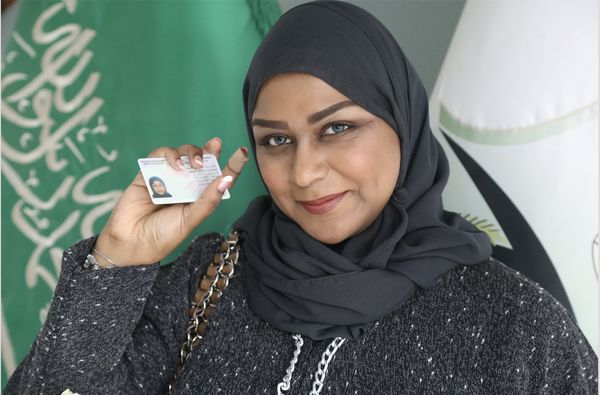Eye For Film >> Movies >> Saudi Women's Driving School (2019) Film Review
Saudi Women's Driving School
Reviewed by: Jennie Kermode

In June 2018, after decades of campaigning, Saudi Arabia passed a royal decree giving women the right to drive. At the time of writing, however, Loujain al-Hathloul, Samar Badawi, Nassima al-Sada and Nouf Abdulaziz - four of the activists who called for it - remain in prison. What's really going on in the Kingdom? How has the decree affected women's lives? Documentarian Erica Gornall tries to find out in this intriguing and surprisingly uplifting film.
Much of it revolves around the Saudi Driving School in Riyadh, which is focused solely on training women and trying to get them through their tests. Anyone familiar with the aggressive way many Saudis drive will appreciate the challenges involved in making sure any new driver will be reasonably safe on the roads, but on the other hand, with car ownership out of reach of poorer families and with generally good public transport systems in operation, there's comparatively little traffic around. Some of the women go out into the desert to practice where there's nothing and nobody to collide with. In formal lessons, the focus is on the same details that apply elsewhere: using mirrors correctly, checking when turning, all that mundane stuff. What makes it different is that a combination of the heat and the difficulty many women still face in going out without male guardians that means passing the test will transform their lives in a really big way.

These are not, however, the only stories. Young Amjad has gone straight from being forbidden to drive to setting her heart on becoming a race care driver. Her sister Fadia says her driving is terrible and hesitates to get in a car with her, yet wants to be around in case anything goes wrong. Amjad is approaching it the right way, with a professional coach, but when travelling at serious speed the inevitable dust on the track creates hazards, leading to some nail-biting moments for Fadia and for the audience. Amjad will not be deterred. She has the same passion that certain young people feel for fast cars all over the world, shattering stereotypes about Saudi women with her wide grin and hard-eyed stare.
Shahad, meanwhile, has chosen to make a living as an Uber driver. It seems a potentially dangerous occupation in a country where the law does little to protect women from assault, but then no part of the world is really safe in that way, and like women everywhere, Shahad manages difficult situations by remaining calm and confident and possessed of a natural authority. She's also good-natured and happy to make conversation with men in her cab, sometimes discussing women's rights. Most of them approve of the idea of women driving. Few, she says, have refused to be driven by her, citing numbers similar to those that crop up in other countries where other form of prejudice influence people's choices. She clearly loves her job and takes these encounters in her stride.
An interview with a passenger in Shahad's cab provides one of the film's more revealing moments. He sees no reason why women shouldn't have the same rights as men in lots of areas. There are just a few curious exceptions. Shahad prompts him to try to clarify his thoughts on these. They seem rooted in a concern that society is changing in a way that could make men unimportant. He doesn't dismiss women's capabilities; he's just insecure, struggling with a vision of life that has not yet been fully articulated.
Feminism in Saudi Arabia is not the same as feminism elsewhere; every culture approaches these ideas in its own way. Here we meet women, too, who are concerned about the pace of change, and others who are working on practical ways to integrate their new freedoms with traditional domestic roles. Being able to drive makes some aspects of these easier, especially where factors like work or illness limit the extent to which male family members are able to fulfil their roles. As the usefulness of female drivers becomes apparent to everybody, it's clear that the practice is here to stay.
So why the jailing of activists? Gornall does not ignore this issue. She incorporates interview footage with senior political players alongside more casual conversation. What emerges is a concern that granting this right could lead to women expecting more and more. There is a suggestion that those in power feel they should wait and be grateful for what has been granted to them, with any further change proceeding slowly and being decided on at the top, not on the basis of grassroots pressure which could give people the wrong idea about who is in charge more generally.
This conclusion might make the film sound rather dispiriting, but it is quite the opposite. Such is the joy among the women embracing their new freedom that one cannot help but share in it. For some of those who want more, there's the sense that this is the start of something positive which they never really expected to see. Underlying it all is a sense of cultural change, new ways of thinking that are gradually moving through society and changing the way people think about one another, changing the way they communicate.. Gornall's film captures the sense of wonder that comes from expanded horizons and the simple pleasure of hitting the road.
Reviewed on: 19 Oct 2019














